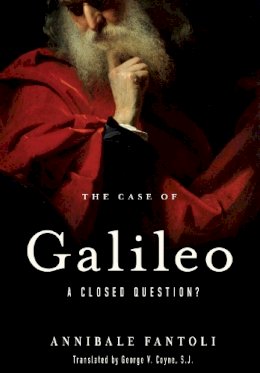An internationally known Galileo scholar, Annibale Fantoli is adjunct professor of philosophy at the University of Victoria. An English edition of his biography Galileo: For Copernicanism and for the Church was published in 1994 by the Vatican Observatory and distributed by the University of Notre Dame Press. It has since reached a third edition and been translated into several languages.
“Fantoli’s account is thorough and suitable for those without specific expertise in the history of science . . . [and] his conclusions offer larger lessons. While the Inquisition no longer exists, the Catholic Church’s intransigence on issues such as birth control, for which its official doctrine runs counter to the practices of millions who consider themselves to be Catholic, suggests, for Fantoli, that the Catholic Church must embark on greater dialogue with the whole of contemporary religious and secular thought in order to avoid the same failings that it created in 1616 and 1633.” —European Historical Quarterly “The Case of Galileo offers an accessible overview of the controversy in its time. Written for a popular audience, and based on a more scholarly earlier book (Galileo For Copernicanism and for the Church), Fantoli’s overview of the evidence here will offer interested readers a useful point of entry into the early modern controversy.” —Comitatus “Annibale Fantoli is the distinguished author of Galileo: For Copernicanism and for the Church (Notre Dame, 1994), and this new book is a revised and abridged edition for the general public. It is one of the best accounts of the life and achievements of Galileo, and it is excellently translated by George V. Coyne, who played a major role in the rehabilitation of Galileo in recent years.” —The Catholic Historical Review “Fantoli, already well-published on Galileo (1564-1642), traces both the complexities of Galileo’s dealings with and condemnation by the Catholic Church of his day, and the successes and failures of more recent papal efforts to finally move beyond what for most people today remains a notorious case of religion attempting to stifle scientific progress. . . . Though books on the Galileo case are extraordinarily abundant, this volume merits attention both by historians and by anyone concerned with how papal bureaucracy may be functional and/or dysfunctional.” —Theological Studies “Fantoli provides a simplified version of his scholarly Galileo: For Copernicanism and for the Church . . . for the general reader. . . . Fantoli’s analysis of the ‘burdensome inheritance of the Galileo affair’ is more extensive than his earlier work and pertinent to the continuing struggle between science and religion. The excellence of the prose is a product of the author’s ideas and the translator’s skill.” —Choice “Using original documents, Annibale Fantoli masterfully reconstructs the events in Italy and Catholic Europe at the beginning of the seventeenth century that led to the confrontation between the church and Galileo, a devout Catholic. . . . His book gives a highly-nuanced reading of the cultural and academic environment of the time, including the interwoven issue of the relationship between theology and the newly emerging modern concept of science as a separate academic discipline.” —New Catholic Books and Media “George Coyne has beautifully rendered into English Annibale Fantoli’s original Italian text.” —Fellowship of Catholic Scholars Quarterly “For readers with a desire to uncover more than the familiar, but inaccurate, narrative of the Galileo case as one of science versus faith, Fantoli thoroughly examines the exact issues Galileo, his allies, and his critics confronted.” —U.S. Catholic "Annibale Fantoli has justly earned an international reputation as the outstanding expert on the condemnation of Galileo by the Catholic Church for heresy in 1633, after the publication of his work promoting the concept of terrestrial motions. Among the significant factors Fantoli has explored are differences on philosophical, religious, and political issues among factions within the Church. Yet, for centuries the Catholic Church maintained that contradiction of the validity of certain passages in Scripture was unacceptable, if not heretical. However, as Fantoli notes in The Case of Galileo, the Church slowly began to modify its official stance in the centuries after Galileo. The most significant on the issue of the condemnation of Galileo occurred with a speech by Pope John Paul II several decades ago, in which he celebrated Galileo's achievements and acknowledged the need to further study the errors made by the Church. As Fantoli rightly states, that has not yet been done, and issues on relationships between faith and science may continue to remain significant. This book is an important contribution to discussion of those issues." —Wilbur Applebaum, Illinois Institute of Technology “This book is an excellent account of the trial and condemnation of Galileo by the Inquisition in 1633. It is a simplified and streamlined version adapted from the erudite book on the topic for which Fantoli is well known and highly respected among scholars. But like the erudite book, this one is well balanced with respect to the contrasts of science vs. religion, Galileo vs. the Catholic Church, history vs. philosophy, and factual detail vs. contemporary relevance.” —Maurice A. Finocchiaro, University of Nevada Las Vegas

